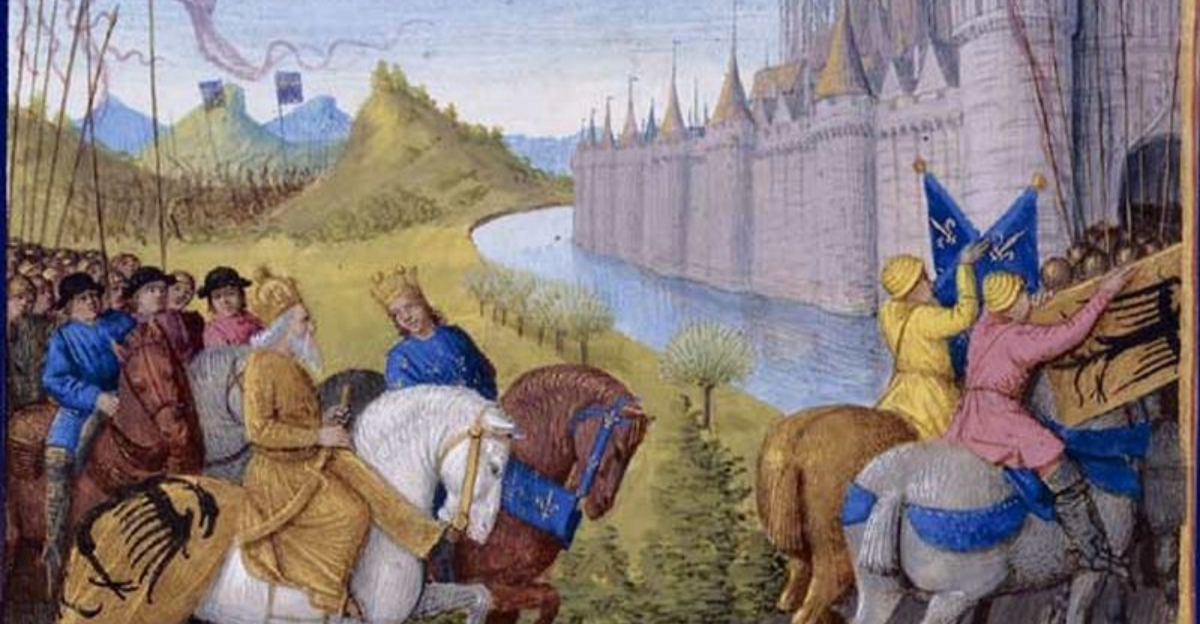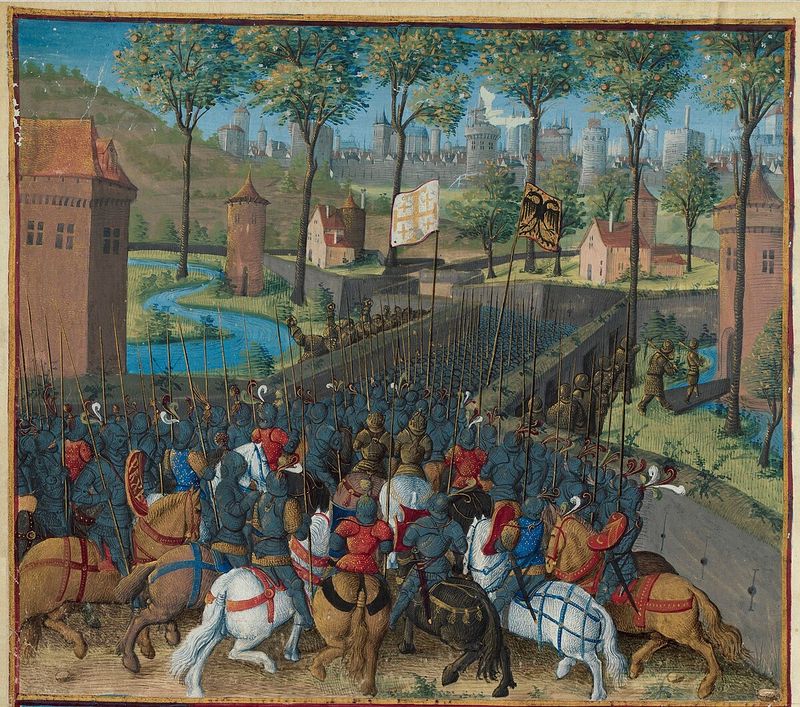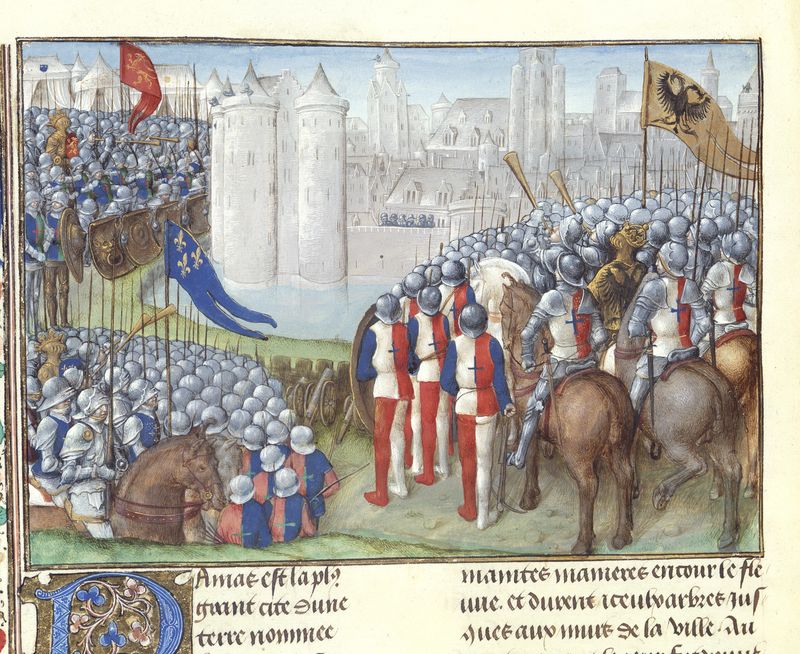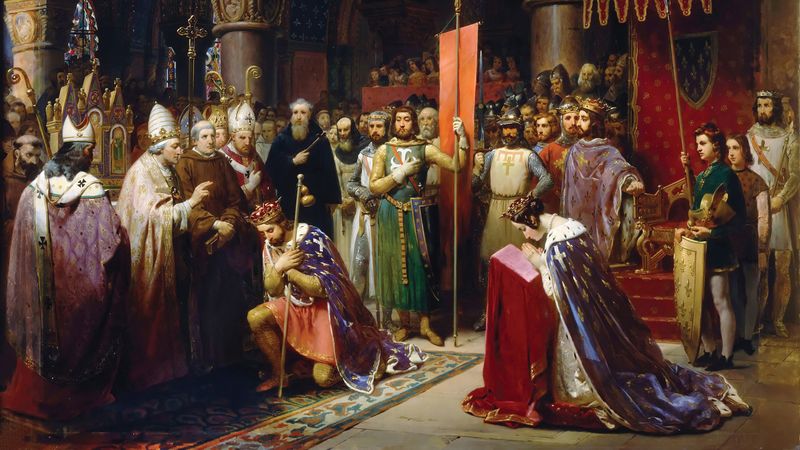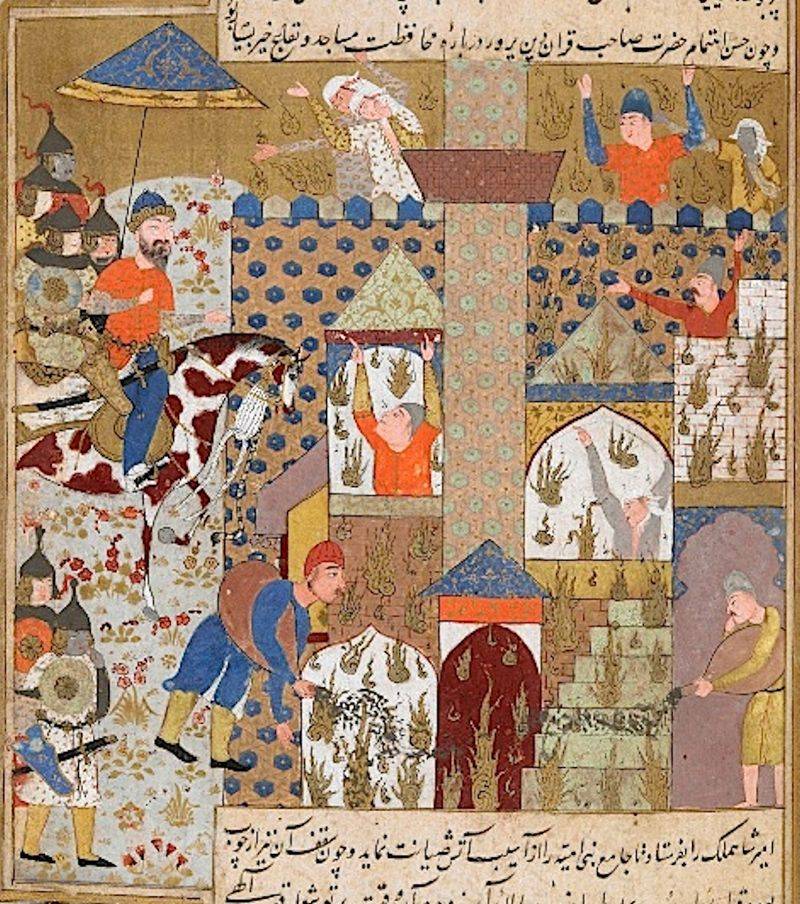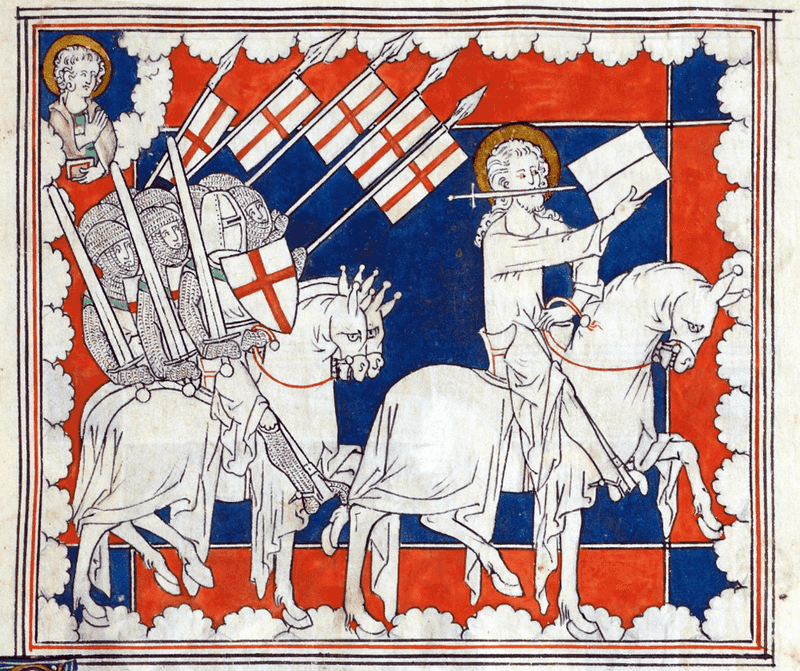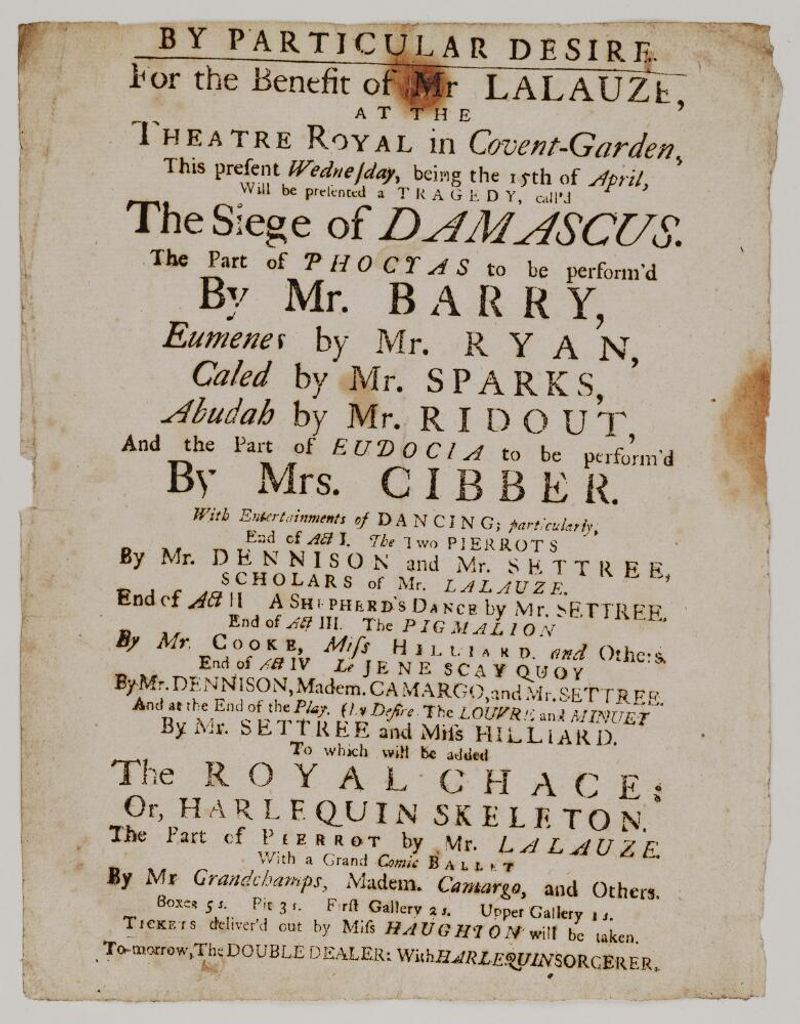The Siege of Damascus in 1148 marked a turning point in the Second Crusade. What should have been a glorious victory for Christian forces instead became one of history’s most embarrassing military failures.
The events at Damascus changed the political landscape of the Middle East for generations and taught harsh lessons about warfare that still resonate today.
1. It Was Supposed to Be the Crusaders’ Big Win of the Second Crusade
The Crusader armies marched toward Damascus with swagger and confidence. They believed this city would be the jewel in their crown—a stepping stone to reclaiming Jerusalem and securing Christian dominance in the Holy Land.
European nobles had spent fortunes preparing for this moment. Priests assured soldiers that God would deliver Damascus into Christian hands. The entire campaign had been blessed by Pope Eugene III himself.
Nobody in the Crusader camp predicted failure. Their army included the finest knights from France and Germany, experienced veterans who had survived countless battles before arriving at the walls of Damascus.
2. The Siege Lasted Only Four Days
Four days. That’s all it took for the mighty Crusader army to crumble. After months of preparation, gathering supplies, and traveling thousands of miles, their grand campaign collapsed almost immediately.
The siege began on July 24, 1148, with high hopes and ended on July 28 with a humiliating retreat. Each day brought new disasters—water shortages, tactical blunders, and fierce resistance from the city’s defenders.
Western chronicles later tried to explain away the embarrassingly short campaign. Some blamed treachery, others poor leadership, but the stark truth remained: the greatest kings of Europe had been defeated in less than a week.
3. The Crusaders Turned on Their Allies
Damascus had actually been friendly to Christian kingdoms! The city’s leaders had previously made agreements with Crusader states against common enemies like Aleppo and Mosul.
This backstabbing move shocked Damascus. Imagine your neighbor suddenly trying to burn down your house after years of borrowing sugar and watching each other’s pets. The decision to attack a potential ally instead of a true enemy like Aleppo showed how desperate the Crusaders had become.
By betraying Damascus, the Crusaders forced the city into the arms of more radical Muslim leaders. This short-sighted decision created stronger enemies and weakened potential friends throughout the region.
4. King Conrad III and King Louis VII Were Leading the Charge
The siege brought together the most powerful rulers in Western Europe. King Conrad III of Germany and King Louis VII of France personally led their armies to Damascus, making this campaign a royal showcase of Christian might.
These weren’t just figureheads but active battlefield commanders who had staked their reputations on victory. Louis had even brought his wife, Eleanor of Aquitaine, along for what he expected to be a triumphant campaign.
Their presence made the failure even more spectacular. When kings with divine right to rule are forced to retreat, it raises uncomfortable questions about God’s favor. Both monarchs would return home with their prestige severely damaged.
5. The Initial Attack Went Surprisingly Well
The first day actually went great for the Crusaders! They punched through the western defenses of Damascus, capturing the orchards and gardens that provided food and water to the city. Muslim defenders were caught off guard by the ferocity of the attack.
Christian soldiers celebrated what seemed like certain victory. They had secured vital water sources and positioned themselves perfectly for the final assault on the city walls.
Local Muslim chroniclers wrote about the panic inside Damascus that first night. People feared the city would fall by the next day, and emergency prayers were held in mosques throughout Damascus. No one could have predicted how quickly fortunes would reverse.
6. They Suddenly Switched Flanks—And Lost Everything
Someone made a catastrophic decision on day two. Despite holding advantageous positions on the western side, Crusader leaders decided to move their entire army to the eastern side of Damascus. Their reasoning? The eastern walls looked easier to breach.
This move abandoned their secure water supply and well-established positions. The army had to march around the city, exposed to attacks and losing precious time.
When they arrived at the eastern side, they discovered much stronger fortifications than expected. Worse yet, they found no water sources, leaving thousands of men and horses thirsty under the blazing Syrian summer sun. This single decision doomed the entire campaign.
7. Damascus Had the Home Turf Advantage
Fighting on unfamiliar ground is always tough. The people of Damascus knew every inch of their city and surrounding lands—where water flowed, which paths led where, and how to set up perfect ambushes.
Defenders cut irrigation channels to flood certain areas and make them impassable for heavily armored knights. They poisoned some water sources and hid others. Local fighters would strike quickly from hidden positions, then disappear into a maze of gardens and buildings before Crusaders could respond.
European knights, wearing heavy armor in the Middle Eastern heat, struggled against nimble local fighters who were accustomed to the climate and terrain. Geography became Damascus’s greatest weapon.
8. Muslim Reinforcements Were En Route
Word spread fast across the Muslim world that Damascus was under attack. Nur ad-Din, the powerful ruler of Aleppo and sworn enemy of the Crusaders, immediately gathered his armies and marched to help.
Spies brought this news to the Crusader camp, triggering panic among the leadership. They faced a terrible choice: continue a difficult siege while risking being trapped between the city defenders and Nur ad-Din’s approaching army.
The fear of being caught in this deadly sandwich forced their hand. Rather than risk total destruction, the Crusader kings ordered a retreat before reinforcements could arrive. This decision saved their armies but destroyed any chance of victory in Syria.
9. The Crusaders Were Outmaneuvered Politically
The attack on Damascus backfired spectacularly in the political arena. By threatening a relatively moderate Muslim city, the Crusaders forced Damascus into an alliance with more radical forces like Nur ad-Din of Aleppo.
Damascus had maintained careful neutrality between Crusader states and other Muslim powers. This balancing act collapsed when Christian armies appeared at their gates. The city’s leaders had no choice but to request help from fellow Muslims they had previously avoided.
This new alliance created a unified Muslim front that would eventually lead to Saladin’s rise to power. The Crusaders essentially helped create the very coalition that would later drive them out of the Holy Land entirely.
10. The People of Damascus Fought Fiercely
The Crusaders severely underestimated the will of ordinary citizens to defend their homes. Men, women, and even children joined the fight, turning Damascus into a city of warriors overnight.
Shopkeepers became archers. Farmers fashioned weapons from tools. Religious leaders rallied fighters with passionate speeches about protecting their families and faith. The city’s famous blacksmiths worked day and night repairing weapons and armor.
Western chronicles rarely acknowledge this civilian resistance, preferring to blame their failure on treachery or divine punishment. But contemporary Muslim accounts describe how the people of Damascus transformed their orchards into deadly traps and their narrow streets into killing zones for any Crusader who dared approach.
11. The Retreat Was Disastrous
Running away proved nearly as deadly as staying to fight. As Crusader forces withdrew from Damascus, their orderly retreat quickly descended into chaos. Soldiers abandoned equipment to move faster, while knights fought each other for access to limited water sources.
Muslim forces pursued the retreating army, picking off stragglers and launching hit-and-run attacks. Disease spread through the ranks as exhausted men drank from contaminated water sources in their desperation.
By the time they reached friendly territory, the once-mighty Crusader army was a shadow of itself. Thousands had died not from enemy swords but from thirst, disease, and the crushing weight of defeat that drove some men to desert their comrades.
12. It Marked the Collapse of the Second Crusade
The humiliation at Damascus effectively ended the Second Crusade. After this failure, most European leaders lost their appetite for further campaigns in the Holy Land.
King Louis VII and Conrad III returned to Europe with their tails between their legs. The Pope struggled to explain how an expedition blessed by God could fail so completely. Knights who had spent their fortunes joining the Crusade questioned their sacrifices.
The grand religious fervor that had launched the Second Crusade evaporated. Many began to wonder if God truly wanted Christians to control Jerusalem at all. This crisis of faith would haunt Western Europe for decades and make raising armies for future Crusades much more difficult.
13. The Crusaders Lost Credibility
Trust is hard to earn and easy to lose. After Damascus, even Christian kingdoms in the Holy Land stopped trusting Western Crusaders. The kings of Jerusalem, Antioch, and Tripoli began viewing European “help” with suspicion rather than gratitude.
Local Christians had warned against attacking Damascus, preferring to maintain peaceful trade relations with the city. When their advice was ignored and the campaign failed spectacularly, they felt vindicated but vulnerable.
This breakdown in trust created deep divisions within Christian ranks. Eastern Christians increasingly sought their own diplomatic solutions with Muslim neighbors rather than relying on Western knights who seemed more interested in glory than practical politics.
14. The Siege Strengthened Islamic Unity
Nothing unites enemies like a common threat. Before the siege, the Muslim world was divided by rivalries and power struggles. Damascus and Aleppo were competitors, not allies.
The Crusader attack changed everything. Suddenly, Muslim leaders realized they needed to set aside their differences to survive. This newfound unity would eventually allow Nur ad-Din and later his successor Saladin to unite Syria and Egypt under one banner.
This Islamic coalition would grow strong enough to recapture Jerusalem in 1187, effectively erasing nearly a century of Crusader gains. By attacking Damascus, the Crusaders inadvertently created the very unity among their enemies that would later defeat them.
15. It’s Still a Case Study in Military Failure
Military academies around the world still teach the Siege of Damascus as a textbook example of how not to conduct a campaign. The failure checks all the boxes of military disaster: poor intelligence, terrible logistics, and catastrophic decision-making.
Students learn how the Crusaders abandoned a winning position for no good reason, failed to secure water supplies in desert conditions, and attacked a potential ally instead of a confirmed enemy. The siege demonstrates how even overwhelming military strength can be wasted through bad leadership.
Modern generals study these mistakes to avoid repeating them. The Siege of Damascus reminds military planners that arrogance and poor planning can defeat even the strongest army.
